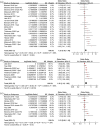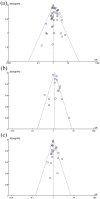Prior percutaneous coronary intervention and outcomes in patients after coronary artery bypass grafting: a meta-analysis of 308,284 patients
- PMID: 35586304
- PMCID: PMC9109498
- DOI: 10.1177/20406223221078755
Prior percutaneous coronary intervention and outcomes in patients after coronary artery bypass grafting: a meta-analysis of 308,284 patients
Abstract
Background: The association between prior percutaneous coronary intervention (PCI) and prognosis after coronary artery bypass grafting (CABG) remains uncertain. We aimed to evaluate the aforementioned association in a meta-analysis.
Methods: PubMed, Cochrane's Library, and Embase databases were searched for potential studies. A random-effects model was used for the meta-analysis. Meta-regression was performed to evaluate the influence of study characteristics on the outcomes.
Results: Thirty-six follow-up studies with 308,284 patients were included, and 40,892 (13.3%) patients had prior PCI. Pooled results showed that prior PCI was associated with higher risks of early (in-hospital or within 1 month) all-cause mortality [odds ratio (OR): 1.26, 95% confidence interval (CI): 1.11-1.44, p = 0.003; I 2 = 64%] and major adverse cardiovascular events (MACEs; OR: 1.36, 95% CI: 1.12-1.66, p = 0.002, I 2 = 79%), but not with late (follow-up durations from 1 to 13 years) mortality (OR: 1.03, 95% CI: 0.95-1.13, p = 0.44, I 2 = 46%) or MACEs (OR: 1.03, 95% CI: 0.97-1.09, p = 0.38, I 2 = 0%). Meta-regression showed that the study characteristics of patient number, age, sex, diabetic status, and proportion of patients with prior PCI did not affect the outcomes. Sensitivity analyses limited to multivariate studies excluding patients with acute PCI failure showed similar results (early mortality, OR: 1.25, p = 0.003; early MACE, OR: 1.50, p = 0.001; late mortality, OR: 1.03, p = 0.70).
Conclusion: The current evidence, mostly from retrospective observational studies, suggests that prior PCI is related to poor early clinical outcomes, but not to late clinical outcomes, after CABG.
Keywords: all-cause mortality; coronary artery bypass grafting; major adverse cardiovascular events; meta-analysis; percutaneous coronary intervention.
© The Author(s), 2022.
Conflict of interest statement
Conflict of interest statement: The authors declared no potential conflicts of interest with respect to the research, authorship, and/or publication of this article.
Figures





Similar articles
-
Prior Percutaneous Coronary Intervention and Mortality in Patients Undergoing Surgical Myocardial Revascularization: Results From the E-CABG (European Multicenter Study on Coronary Artery Bypass Grafting) With a Systematic Review and Meta-Analysis.Circ Cardiovasc Interv. 2018 Feb;11(2):e005650. doi: 10.1161/CIRCINTERVENTIONS.117.005650. Circ Cardiovasc Interv. 2018. PMID: 29440275
-
Meta-analysis Comparing Outcomes of Percutaneous Coronary Intervention of Native Artery Versus Bypass Graft in Patients With Prior Coronary Artery Bypass Grafting.Am J Cardiol. 2021 Feb 1;140:47-54. doi: 10.1016/j.amjcard.2020.10.062. Epub 2020 Nov 2. Am J Cardiol. 2021. PMID: 33144169
-
Prior Percutaneous Coronary Interventions May Be Associated With Increased Mortality After Coronary Bypass Grafting: A Meta-Analysis.Semin Thorac Cardiovasc Surg. 2020 Spring;32(1):59-74. doi: 10.1053/j.semtcvs.2019.09.009. Epub 2019 Sep 23. Semin Thorac Cardiovasc Surg. 2020. PMID: 31557513
-
Influence of previous percutaneous coronary intervention on clinical outcome of coronary artery bypass grafting: a meta-analysis of comparative studies†.Interact Cardiovasc Thorac Surg. 2015 Apr;20(4):531-7; discussion 537. doi: 10.1093/icvts/ivu449. Epub 2015 Jan 11. Interact Cardiovasc Thorac Surg. 2015. PMID: 25583647 Review.
-
Long-term follow-up of percutaneous coronary intervention versus coronary artery bypass grafting in left main coronary artery disease: A systematic review and meta-analysis.Catheter Cardiovasc Interv. 2021 Sep;98(3):427-433. doi: 10.1002/ccd.29338. Epub 2020 Oct 26. Catheter Cardiovasc Interv. 2021. PMID: 33103847
Cited by
-
Late Myocardial Infarction and Repeat Revascularization after Coronary Artery Bypass Grafting in Patients with Prior Percutaneous Coronary Intervention.J Clin Med. 2022 Sep 28;11(19):5755. doi: 10.3390/jcm11195755. J Clin Med. 2022. PMID: 36233623 Free PMC article.
References
-
- Godoy LC, Tavares CAM, Farkouh ME. Weighing coronary revascularization options in patients with type 2 diabetes mellitus. Can J Diabetes 2020; 44: 78–85. - PubMed
-
- Barbarawi M, Zayed Y, Hamid K, et al.. Comparison of coronary artery bypass grafting and drug-eluting stents in patients with left main coronary artery disease and chronic kidney disease: a systematic review and meta-analysis. Cardiovasc Revasc Med 2019; 20: 1184–1189. - PubMed
-
- Nagarajarao HS, Ojha CP, Mulukutla V, et al.. Current use and trends in unprotected left main coronary artery percutaneous intervention. Curr Cardiol Rep 2020; 22: 16. - PubMed
-
- Gu D, Qu J, Zhang H, et al.. Revascularization for coronary artery disease: principle and challenges. Adv Exp Med Biol 2020; 1177: 75–100. - PubMed
LinkOut - more resources
Full Text Sources
Miscellaneous

